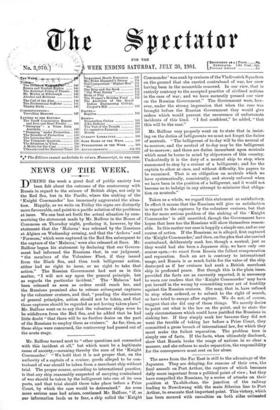Taken as a whole, we regard this statement as satisfactory.
In effect it means that the Russians will give us satisfaction in regard to the captures by the volunteer cruisers, but that the far more serious problem of the sinking of the Knight Commander' is still unsettled, though the Government have hopes that here too the Russians will show themselves reason- able. In this matter our case is happily a simple one, and so our course of action. If the Russians, as is alleged, first captured the 'Knight Commander,' and then, on the plea that she carried contraband, deliberately sank her, though a neutral, just as they would had she been a Japanese ship, we have only one course open,—to exact from Russia the fullest compensation and reparation. Such an act is contrary to international usage, and Russia is as much liable for the value of the ship destroyed as if her cruisers had sunk a British merchant ship in profound peace. But though this is the plain issue, provided the facts are as currently reported, it is necessary to warn our readers that the Knight Commander' may have put herself in the wrong by committing some act of hostility against the Russian cruisers. She may, that is, have refused to stop when ordered, or to submit to the right of search, or have tried to escape after capture. We do not, of course, suggest that she did any of these things. We merely desire to point out what is the law on the point, and to state the only circumstances which could have justified the Russians in sinking her. If they simply sank her because they did not want the trouble of taking her before a Prize Court, they committed a gross breach of international law, for which they must make the fullest reparation. The problem here is simply one of facts. If the facts, when ultimately disclosed, show that Russia broke the usage of nations in so clear a manner, and she refuses to make reparation, the responsibility for the consequences must rest on her alone.






































